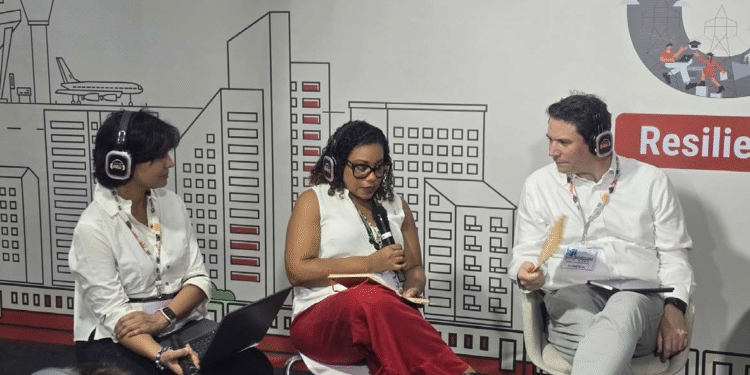Antigua and Barbuda spotlighted its pioneering Debt Sustainability Support Service (DSSS) as a transformative model for aligning debt reform, climate resilience, and sustainable finance during the High-Level Panel on Debt Sustainability and Resilient Infrastructure, held at the Disaster Resilient Infrastructure (DRI) Pavilion at COP30.
Delivering Antigua and Barbuda’s feature intervention, Her Excellency Ruleta Camacho Thomas, Ambassador for Climate Change, underscored that for Small Island Developing States (SIDS), the crises of debt and climate vulnerability are inseparable.
“Every hurricane, drought, and flood destroys infrastructure and public revenue, forcing countries to borrow more just to rebuild,” Ambassador Camacho Thomas stated. “The result is a debt trap that prevents us from investing in the resilience we so urgently need.”
She explained that under the Antigua and Barbuda Agenda for SIDS (ABAS), the DSSS—anchored in the country’s new Centre of Excellence for SIDS—was established to help vulnerable economies integrate debt reform, climate finance, and resilience planning. The Service brings together mechanisms such as debt-for-climate swaps, climate-contingent clauses, resilience-linked bonds, and insurance-backed instruments into one coordinated framework.
“The DSSS is designed to make finance work for resilience, not against it,” she said. “It provides governments with the tools to align fiscal policy, infrastructure investment, and climate adaptation — ensuring that every dollar spent on recovery also builds long-term security.”
The Ambassador noted that Antigua and Barbuda is working closely with partners, including the Coalition for Disaster Resilient Infrastructure (CDRI), to ensure that debt sustainability and infrastructure resilience advance together. “There is no point in restructuring debt if the infrastructure remains fragile — and no point in building resilience if our fiscal space collapses under the weight of debt,” she said.
In a key intervention, Ambassador Camacho Thomas also addressed the role of data analytics in unlocking new investment flows. She observed that while spatial and financial data have the potential to prove the return on investment (ROI) of resilience, they are too often used to label SIDS as “high-risk.”
“It is unfortunate that the same data that could prove the profitability of investing in resilience is being used to exclude us,” she said. “We need to shift that narrative — use data on adaptation outcomes to demonstrate that investing in SIDS is sound economics and good business.”
She called for data on adaptation interventions to be integrated into financial modeling to make the economic case for resilience and attract new public and private investment. “Resilience must be recognized as a financial model, not a moral appeal,” she concluded.
Antigua and Barbuda continues to lead efforts globally to strengthen access to sustainable finance for vulnerable economies and to promote integrated approaches that link debt management, infrastructure resilience, and sustainable growth.



